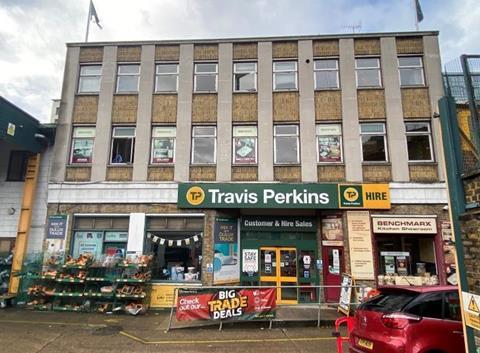Builders Merchants Federation tells Sadiq Khan to delay low emissions scheme by 12 months to give SMEs more time to prepare
Sadiq Khan’s plans to expand the Ultra Low Emissions Zone (ULEZ) to cover all of Greater London could impact the capital’s housing targets, the mayor has been warned.
The Builders Merchants Federation has written to Khan urging him to urgently reconsider the plan, which they say could turn Greater London into a “no-go area” for SME builders, and delay its rollout by a year.
The ULEZ is set to be expanded on 29 August, imposing a £12.50 daily charge on all vehicles which do not meet certain emissions standards, which includes all diesel vans registered before September 2016 and all petrol vans registered before January 2006.

A significant proportion of SME tradespeople working within the M25 use non-compliant vehicles, with many relying on diesel HGVs to move heavy materials such as bricks and timber.
The BMF’s letter said it was concerned that Khan’s officials have “no real understanding of commercial vehicle fleets” and had not allowed sufficient time for builders merchants and their trade customers to make operation changes.
The added charges are expected to result in many small builders choosing to buy materials outside the capital. This would put merchants within the new ULEZ boundary which serve housing projects in London at risk, the BMF said.
“We note that as Mayor, you are often criticised for not meeting your own affordable homes’ targets in London,” the organisation’s letter said.
“The BMF is concerned at any further loss of much-needed SMEs that build, repair and maintain both private property and affordable homes and social housing in London.”
One member of the trade body said up to 40% of its staff would be hit by the charges, while another said up to a quarter of their daily business done through affected branches would be goods collected by customers who would have to pay the charge.
Another firm calculated that using a non-compliant vehicle five days a week would result in £3,000 of annual charges, representing an effective pay cut of around 14%.
BMF chief executive John Newcomb said the burden would result in price hikes for end customers and affect staff levels and the amount of stock held at builders merchants within the ULEZ boundary.
Travis Perkins chief operating officer Frank Elkins said: “Although we fully appreciate the need to drive the impact of emissions down across the whole country, we are asking for more time for residents, tradespersons and workers to be able to adapt.”
Selco chief executive Howard Luft added: “The proposed ULEZ expansion will hurt the residents, workers and tradespeople of London alike, at a time when many are already experiencing great financial hardship with the current cost of living crisis in the UK.”
Although Khan has set up a £110m scrappage scheme to help people on lower incomes acquire compliant vehicles, the BMF told the mayor that it “suspects you recognise” that the fund is insufficient.
“The BMF asks you to try to allocate more funds, if you can, or to lobby Whitehall for more generous funding, please,” the letter said.
It added: “There is no shame in taking more time to get this policy right - and to iron out inconsistencies and wrongful assumptions - to strike a fair, equitable balance between Londoners - rather than sticking rigidly to 29 August 2023.
“The BMF asks you to delay the start date by (at least) 12 months to allow time to (among others) obtain more scrappage scheme funding.”
The latest ULEZ expansion was announced in November last year, giving people working in the capital nine months’ notice.
A previous expansion from central London to cover the North and South Circular Roads was announced by Khan in 2019 and came into force in October 2021, giving people nearly two and a half years to prepare.
According to Autotrader, the median price of a vehicle compliant with ULEZ has risen from just under £13,000 in 2021 to more than £18,000 in 2023.


























No comments yet